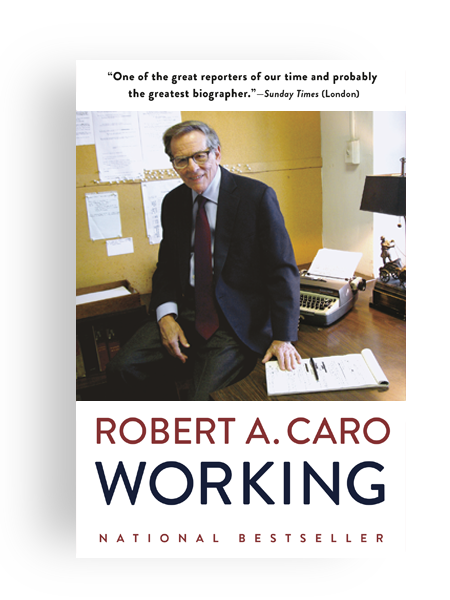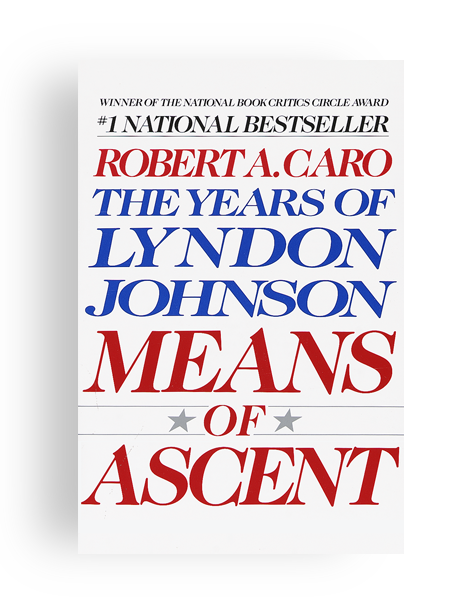THE YEARS OF LYNDON JOHNSON IV
The Passage of Power
The Passage of Power follows Lyndon Johnson through both the most frustrating and the most triumphant periods of his career—1958 to1964. It is a time that would see him trade the extraordinary power he had created for himself as Senate Majority Leader for what became the wretched powerlessness of a Vice President in an administration that disdained and distrusted him. Yet it was, as well, the time in which the presidency, the goal he had always pursued, would be thrust upon him in the moment it took an assassin’s bullet to reach its mark.
By 1958, as Johnson began to maneuver for the presidency, he was known as one of the most brilliant politicians of his time, the greatest Senate Leader in our history. But the 1960 nomination would go to the young senator from Massachusetts, John F. Kennedy. Caro gives us an unparalleled account of the machinations behind both the nomination and Kennedy’s decision to offer Johnson the vice presidency, revealing the extent of Robert Kennedy’s efforts to force Johnson off the ticket. With the consummate skill of a master storyteller, he exposes the savage animosity between Johnson and Kennedy’s younger brother, portraying one of America’s great political feuds. Yet Robert Kennedy’s overt contempt for Johnson was only part of the burden of humiliation and isolation he bore as Vice President. With a singular understanding of Johnson’s heart and mind, Caro describes what it was like for this mighty politician to find himself altogether powerless in a world in which power is the crucial commodity.
For the first time, in Caro’s breathtakingly vivid narrative, we see the Kennedy assassination through Lyndon Johnson’s eyes. We watch Johnson step into the presidency, inheriting a staff fiercely loyal to his slain predecessor; a Congress determined to retain its power over the executive branch; and a nation in shock and mourning. We see how within weeks—grasping the reins of the presidency with supreme mastery—he propels through Congress essential legislation that at the time of Kennedy’s death seemed hopelessly logjammed and seizes on a dormant Kennedy program to create the revolutionary War on Poverty. Caro makes clear how the political genius with which Johnson had ruled the Senate now enabled him to make the presidency wholly his own. This was without doubt Johnson’s finest hour, before his aspirations and accomplishments were overshadowed and eroded by the trap of Vietnam.
In its exploration of this pivotal period in Johnson’s life—and in the life of the nation—The Passage of Power is not only the story of how he surmounted unprecedented obstacles in order to fulfill the highest purpose of the presidency but is, as well, a revelation of both the pragmatic potential in the presidency and what can be accomplished when the chief executive has the vision and determination to move beyond the pragmatic and initiate programs designed to transform a nation. It is an epic story told with a depth of detail possible only through the peerless research that forms the foundation of Robert Caro’s work, confirming Nicholas von Hoffman’s verdict that “Caro has changed the art of political biography.”

Book Four of Caro’s monumental The Years of Lyndon Johnson displays all the narrative energy and illuminating insight that led the Times of London to acclaim it as “one of the truly great political biographies of the modern age. A masterpiece.”
PURCHASE THE BOOK
Winner of the National Book Critics Circle Award
Winner of the Los Angeles Times Book Prize
Winner of the Mark Lynton History Prize
Winner of the American History Book Prize
Praise for The Passage of Power
PRESIDENT BILL CLINTON on the front cover of THE NEW YORK TIMES BOOK REVIEW
“Brilliant . . . Important . . . Remarkable . . . Caro shows Johnson’s genius for getting to people—friends, foes, and everyone in between—and how he used it to achieve his goals . . . With this fascinating and meticulous account, Robert Caro has once again done America a great service.”
MICHAEL SCHAUB, NPR
“A masterpiece…As absorbing as a political thriller…By writing the best presidential biography the country has ever seen, Caro has forever changed the way we think, and read, American history . . . Although the amount of research Caro has done for these books is staggering, it’s his immense talent as a writer that has made his biography of Johnson one of America’s most amazing literary achievements.”
MICHIKO KAKUTANI, THE NEW YORK TIMES
“A breathtakingly dramatic story about a pivotal moment in United States history [told] with consummate artistry and ardor . . . It showcases Mr. Caro’s masterly gifts as a writer: his propulsive sense of narrative, his talent for enabling readers to see and feel history in the making and his ability to situate his subjects’ actions within the context of their times . . . Caro manages to lend even much-chronicled events a punch of tactile immediacy . . . Johnson emerges as both a larger-than-life, Shakespearean personage—with epic ambition and epic flaws—and a more human-scale puzzle.”
JORDAN MICHAEL SMITH, THE BOSTON GLOBE
“Making ordinary politics and policymaking riveting and revealing is what makes Caro a genius. Combined with his penetrating insight and fanatical research, Caro’s Churchill-like prose elevates the life of a fairly influential president to stuff worthy of Shakespeare . . . Robert Caro stands alone as the unquestioned master of the contemporary American political biography.”
MICHAEL BURLEIGH, LONDON LITERARY REVIEW
“The politicians’ political book of choice . . . An encyclopedia of dirty tricks that would make Machiavelli seem naïve.”
THOMAS MEANEY, THE NATION
“By dramatizing the capacities and limitations of the most talented politician of the postwar era, Caro aims to make readers shrewder citizens.”
ROBERT HARRIS, THE GUARDIAN
“The adjective ‘Shakespearean’ is overused and mostly undeserved but not in this case. LBJ emerges from this biography as a fully rounded tragic hero: cowardly and brave, petty and magnificent, vindictive and noble, a man of vaunting ambition and profound insecurities. Caro marries profound psychological insight with a brilliant eye for the drama of the times.”
PAUL GIANOTTI, NEWSDAY
“Brilliant biography, gripping history, searing political drama and an incomparable study of power. It’s also a great read . . . And, after thousands of pages spent with Lyndon Johnson, one of Caro’s singular achievements is that you want more.”
GEORGE F. WILL
“The Years of Lyndon Johnson, when completed, will rank as America’s most ambitiously conceived, assiduously researched and compulsively readable political biography.”
WENDY SMITH, LOS ANGELES TIMES
“Epic…A searing account of ambition derailed by personal demons …a triumphant drama of ‘political genius in action’…Caro combines the skills of a historian, an investigative reporter and a novelist in this searching study of the transformative effect of power.”
DARREN FRANICH, ENTERTAINMENT WEEKLY
“An addictive read, written in glorious prose that suggests the world’s most diligent beat reporter channeling William Faulkner…It’s also an incisive portrait of one great, terrible, fascinating man suddenly given the chance to reinvent the country in his image.”
TOM PERROTTA, author of THE LEFTOVERS
“The fourth volume of Caro’s epic chronicle of Lyndon Johnson’s life and times is a political biography elevated to the level of great literature. His L.B.J. is a figure of Shakespearean magnitude, whose sudden ascension from the abject humiliations of the vice presidency to the summit of political power is a turn of fortune worthy of a Greek myth. Caro makes you feel the shock of J.F.K.’s assassination, and brings you inside Johnson’s head on the blood-drenched day when his lifelong dream finally comes true. It’s an astonishing and unforgettable book.”

In charge—“in command”—journalists said about him. In part, they say, it was because of the aura around him, what one of the journalists says was “the knowledge we had of what this guy had done, of what this guy could do. Of what he wanted to be.” But there was something more. As another reporter says: “Power just emanated from him. There was that look he gave. There was the way he held his head. Even if you didn’t know who he was, you would know this was a guy to be reckoned with. You would feel: don’t cross this guy….He would look around the Chamber—it was like he was saying, ‘This is my turf.’”
FROM THE PASSAGE OF POWER

Robert Caro Books
He has measurably enriched our lives with his intellectual rigor, his compassion, his openness, his wit and grace.
SIR HAROLD EVANS, THE NEW YORK TIMES




